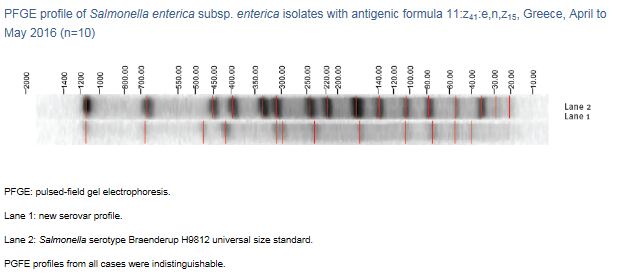The pulsed-field gel electrophoresis (PFGE) profiles were indistinguishable and no apparent epidemiological link has been identified with results of a case–case study pending.
According to the Pasteur Institute, the isolates represent a new serotype of Salmonella enterica subspecies Enterica.
No matching isolates
Based on the database of the NRLSS and the Veterinary Reference Laboratory for Greece, the antigenic type 11:z41:e,n,z15 has never been identified before from animals, animal products or food samples.
“According to some preliminary findings, a new Salmonella enterica sub. enterica serovar seems to have caused an outbreak in Greece over two months in the first half of 2016, with 10 cases (and one asymptomatic) as of 27 May,” said the researchers.
“We encourage other countries to contact authors in case of identifying isolates of the new serovar of Salmonella enterica susp. enterica with the antigenic type 11:z41:e,n,z15.”

The PFGE profile was uploaded to the European Surveillance System (TESSy) of the European Centre for Disease Prevention and Control (ECDC) and an urgent inquiry was launched via the ECDC’s Epidemic Intelligence Information System (EPIS).
According to the ECDC food and waterborne diseases curators, no isolates with a matching PFGE profile had been reported to TESSy and none of the 15 countries that replied had identified the new serovar in the past.
Case report
All cases were of Greek nationality and eight were children. Three reported a household contact with similar symptoms (another child in the same family).
Investigation of the possible household clusters showed they were most probably co-infected but none of the household contacts was laboratory-confirmed.
Laboratory confirmed cases were interviewed by telephone with a standard trawling questionnaire for investigating salmonellosis cases. Based on results from this questionnaire, no food item emerged as possible source of the infections.
All were susceptible to antimicrobial agents, including third generation cephalosporins and fluoroquinolones.
The majority of the cases were in the region of Attica, one case was identified in Kastoria in northern Greece, and another in Korinthos, central Greece.
Only one reported travel abroad to Torino, Italy, five days before symptom onset and started developing symptoms before returning to Greece.
The antigenic type of the eleven isolates was 11:z41:e,n,z15, which is not referred to in the 9th edition of the White-Kauffman–Le Minor Scheme.
Source: Eurosurveillance, Volume 21, Issue 25, 23 June 2016
“An outbreak of a possibly new Salmonella Enterica subspecies Enterica serovar with the antigenic formula 11:z41:e,n,z15,Greece, March to May 2016: Preliminary results”
Authors: G Mandilara, K Mellou, K Karadimas, L Georgalis, M Polemis, T Georgakopoulou, A Vatopoulos
